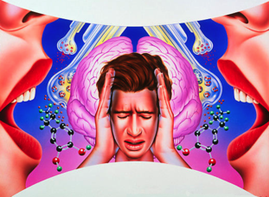
In the article below, we learn of some of the hypotheses surrounding the association between urban living and psychosis, including the impact of genetics, social drift, and the negative psychological impact of living in a big city.
"The link between psychosis and city living was first noticed by American psychiatrists in the early 1900s who found that asylum patients were more likely to come from built-up areas. This association was sporadically rediscovered throughout the following century until researchers verified the association from the 1990s onwards with systematic and statistically controlled studies that tested people in the community as well as in clinics.
One particularly extensive study using health records for almost the entire population of Denmark found that the risk of being diagnosed with schizophrenia increased in a small but proportional way as people spent more time spent living in urban environments. Many studies have since replicated this finding, with neighborhood levels of social deprivation seeming to amplify the association and levels of social integration seeming to reduce it."
For the full story click here:
http://www.theatlantic.com/health/archive/2016/07/the-enigma-of-urban-psychosis/491141/









 RSS Feed
RSS Feed
